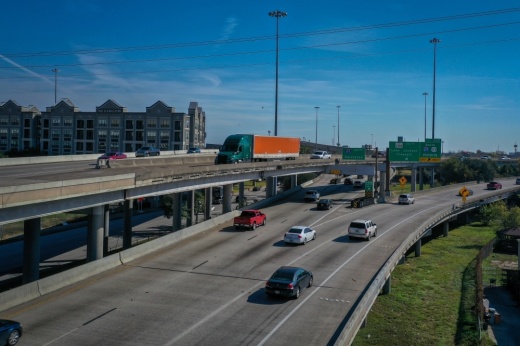However, the controversial project remains stalled by a federal investigation, and Bruce Bugg, chairman of the Texas Transportation Commission, said not much can be done until that investigation clears up.
"It's crystal clear to me TxDOT is ready to build the NHHIP, no question about it," Bugg said at the Aug. 31 meeting. "But we can’t do it until the [Federal Highway Administration] releases the hold."
The $7 billion NHHIP has been part of regional transportation plans in Houston dating back to 2004. The project, as proposed, involves rerouting I-45 to follow I-69 east of downtown rather than its existing path through Midtown. Proponents of the project have said it will ease congestion, particularly for commuters, improve safety and mitigate flooding issues.
However, opponents have argued the project will have disproportionately negative effects on Black and Hispanic communities along its route. The project would displace over 900 residences, 300 businesses, five places of worship and two schools, according to TxDOT’s Final Environmental Impact Statement.
"The UTP is stacked with projects that prioritize the movement of a few cars over the well being of the majority of Texans," said Neal Ehardt, a representative from the group Stop TxDOT I-45, at the Aug. 31 meeting. "We have reached the limit of what can be achieved by building only for cars."
Launched earlier this year, the FHWA investigation is exploring possible civil rights violations within the project's design. Harris County also sued TxDOT over the project in March, arguing that TxDOT failed to adequately consider the full environmental ramifications of the project.
TxDOT's 10-year plan—known as the Unified Transportation Plan, or UTP—is required by state law to be updated annually in a process that involves taking public comments and working with local metropolitan planning organizations across the state, such as the Houston-Galveston Area Council.
The I-45 expansion project has received the support of the H-GAC, and members of the group's transportation subcommittee approved a nonbinding resolution in March to keep working with TxDOT on the project.
"I believe it is an opportunity to improve the quality of life for the region as a whole, so we look forward to it staying in the UTP," said Craig Raborn, the executive director of H-GAC's Transportation Policy Council, at the Aug. 31 meeting.
Others who spoke in favor of the project at the meeting included Harris County precinct commissioners Jack Cagle and Tom Ramsey, Sugar Land Mayor Joe Zimmerman and Galveston County Commissioner Ken Clark, who said the improvements could be vital for evacuation purposes during the next hurricane.
A recent online survey from TxDOT seeking feedback on the project found 5,529 people in support of it, 2,555 people wanting the project removed and 86 people who wanted to maintain the funding but did not want to build the project as proposed.
Supporters cited those survey results to argue the project should continue. However, opponents said the survey was flawed, arguing that TxDOT did not do enough to garner feedback from those who would be directly affected.
Some opponents stressed that the funding should not be removed from the region, and that it should instead be used to pursue a more equitable project along the corridor—one that offers more modes of transportation, reduces climate change and better considers nearby communities of color.
"This engagement process missed a third option: support maintaining funding but redesigning the project to better respond to community input," said Jonathan Brooks, director of policy and planning with the transportation advocacy group LINK Houston. "The current project doesn’t serve anybody in communities outside of Beltway 8."
With the UTP approved, Bugg said the commission would revisit the I-45 project and the status of the federal investigation at its December meeting to determine what should be done.
"If no progress has been made, and we’re still halted and we have no viable path forward from the FHWA, then our responsibility goes back to the taxpayers of the state of Texas," he said.





